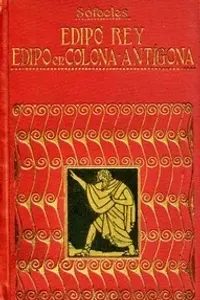Resumen
This trilogy of Theban plays by Sophocles—Edipo rey (Oedipus Rex), Edipo en Colona (Oedipus at Colonus), and Antígona (Antigone)—forms one of the most powerful dramatic cycles in Western literature.
Together, they explore fate, guilt, redemption, and moral responsibility within the cursed royal family of Thebes.
In Edipo rey, King Oedipus seeks the truth behind a plague afflicting his city, only to uncover his own tragic origin: he has unknowingly killed his father and married his mother.
The revelation leads to ruin and exile.
Edipo en Colona follows the blind, wandering Oedipus as he seeks peace and a sacred resting place in Colonus, where he finds redemption through divine will before his death.
Finally, Antígona tells the story of Oedipus's defiant daughter, who chooses to honor her brother with a proper burial in defiance of King Creon’s edict, sparking a moral and political crisis with devastating consequences.
Together, these plays examine human limits before fate and the gods, the collision of personal duty and state law, and the enduring struggle for justice, dignity, and truth.
